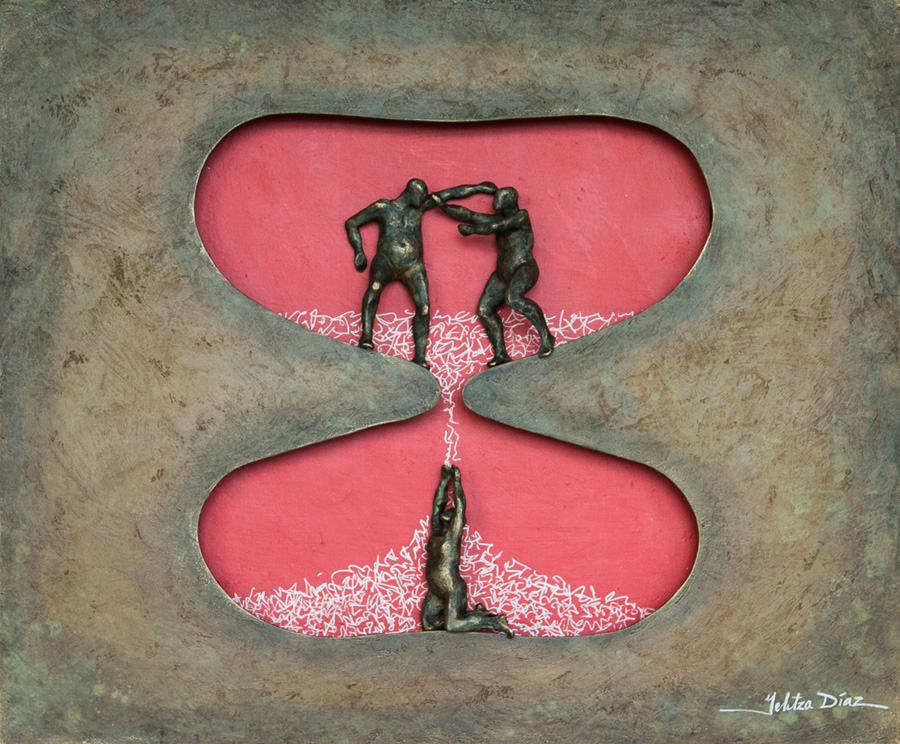
Iris and her Son are Reunited
30 x 36 x 3″
Wood covered and painted, beings in painted ceramic.
Sculptural ceramic
2017
Biography
Yelitza Díaz was born in Venezuela in 1973. She graduated from the Escuela de Artes Plásticas Arturo Michelena en Valencia-Venezuela, mención: Arte Puro (1995), before pursuing a specialization in ceramics and sculptures at the Universidad de Carabobo, Valencia (2009). Since moving to the United States in 2013, she has continued to receive awards and recognition for her artistic work. Her involvement in the fine arts began during her childhood. Passionate about the human figure, she elaborates her sculptures with ceramic techniques in a minimalist-contemporary style and with a clear inclination for human existentialism, based on political-social events in her native Venezuela. Her art also reflects hope and the deepest human feelings.
Creative Interpretation
The loss of a child is always a great trauma for a mother; what should have been a successful journey and reunion resulted in a long separation. Amidst the despair and separation, the passage of time became evident. The son grew up and adapted to a new culture and a life with new opportunities. When at last the mother managed to recover her son, his reproach was evident. The opportunity for a better future had been taken away from him, something that the mother in her anxiety for recovering her loved one could not understand. This story deeply impacts me, since I believe that the human being is very uncertain. The results of our actions are not like mathematics: two plus two never equals four. The results for the “small beings” of our world depend not only of the numerical value, but also on the color, size, shape and context of the number. In the artwork that I present as an interpretation of the narrated story, I try to reflect the passage of time to the public. The child who gets lost in the hourglass and high up in time, the mother who recovers her son already made man.
Iris se encuentra con su hijo
30 x 36 x 3″
Madera cubierta y pintada, seres en cerámica pintada.
Cerámica escultórica
2017
Biografía
Yelitza Díaz nació en 1973 en Venezuela. Egresa de la Escuela de Artes Plásticas Arturo Michelena en Valencia-Venezuela, mención: Arte Puro (1995), realiza la especialización en cerámica-escultórica en la Universidad de Carabobo, Valencia (2009). En el año 2013 se muda a Estados Unidos donde al igual que en su tierra natal obtiene premios y reconocimiento por su trabajo artístico. Desde niña se envuelve en la vida de las bellas artes. Apasionada de la figura humana, elabora sus esculturas con técnicas cerámicas bajo un estilo minimalista-contemporáneo y con una clara inclinación por el existencialismo humano, con base en acontecimientos generalmente político-sociales de su país natal, Venezuela. Con su obra intenta reflejar la esperanza y los sentimientos más profundos del ser humano.
Interpretación creativa
La pérdida de un ser querido siempre supone un gran trauma para una madre; lo que pudo ser un inocente viaje, resultó en la separación y una larga espera por recuperar a su hijo. Entre la desesperación y los esfuerzos infructuosos por no ver a su hijo encarcelado, el paso del tiempo se hizo notorio, el hijo creció y se adaptó a una nueva cultura. Por demás fructífera y llena de oportunidades; cuando al fin la madre logró recuperar a su hijo, el reproche de él fue evidente, se le había quitado la oportunidad de un futuro mejor, cosa que la madre en sus ansias por recuperar a su ser querido no podía entender. Esta historia me impactó profundamente, ya que creo que el ser humano es muy incierto, los resultados de nuestras acciones no son como las matemáticas, nunca dos más dos es cuatro. Los resultados para los “pequeños seres” de nuestro mundo, dependen no solo del valor numérico, sino también del color, tamaño, forma y contexto del número. En la obra que presento como interpretación de la historia narrada, intento reflejar al público el paso del tiempo. El niño que se pierde en el reloj de arena, y arriba muy lejos en el tiempo, la madre que recupera a su hijo ya hecho hombre.
